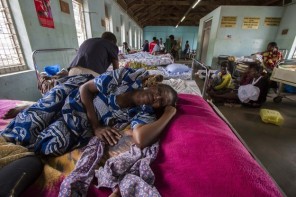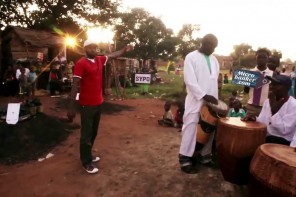Next month, Uganda is having a presidential election — or, depending on your viewpoint, a mini-re-coronation. The Economist last fall called Museveni a “king by acclamation,” and not just because he’s been around forever, has a lot of houses, and puts his family in charge of most major posts. The magazine’s Africa folks blogged, “Mr Museveni has been careful to prevent any younger candidates building up a power base that could challenge him. He appears determined to stay until 2016, even if it means dividing his party, alienating military commanders, and arresting opposition leaders such as Olaru Otunnu, who used to work for the United Nations.”
The word on the street is that most people think Museveni’s around to stay. In fact, a new poll — billed by the government-friendly New Vision as an “opposition poll” — put Museveni’s likely support at 66 percent (or 67, depending on where in the article you’re reading). That’s far above his closest competitor, Kizza Besigye (19%).
This, of course, doesn’t inspire any politician much, except perhaps Museveni. Today, Besigye said that his party might pull out of the poll. The Southern African Press Association (SAPA) reports:
“If it is clear to us that this election is a completely hopeless process, we could still pull out at any time,” presidential candidate Kizza Besigye said on Monday while recording a televised electoral debate.
Besigye, who is due to challenge President Yoweri Museveni on February 18 on behalf of the four-party Inter-party Co-operation (IPC), went on to clarify that by “hopeless” he meant “fraudulent”.
Sound familiar? A coalition of opposition parties made the same threat in Burundi during the presidential campaigns in June. They followed through, leaving Burundians with only one name to vote — for or against, depending on which envelope you chose — on election day. That, in turn, solidified the ruling party’s grip on political power, a hold that has many people worried about an increasing authoritarianism.
But Uganda has one thing Burundi didn’t: An on-the-record worry by an EU official. According to SAPA, the departing EU ambassador told the independent Ugandan Daily Monitor that he worried about the free-and-fair-ness of the coming vote.
“I note particularly opposition parties still encounter difficulties in campaigning, in holding rallies, from time to time harassment, maybe intimidation, also access to the media,” he said.
“I hope that in the coming weeks one can make an effort to ensure the playing field will improve.”
There’s still time — for Museveni to change his game, and for someone to remind Besigye that opposition pull-outs hurt one group above all others: the opposition.



I agree with the conclusion that the “empty chair” tactic ends up hurting the opposition. In Burundi, the opposition basically handed absolute power to the incumbent and they will live to regret that decision.
So the good people of Uganda deserves an opposition worth of its name. Even if Museveni ends up winning the coming elections, it is a good practice to give people an alternative choice.